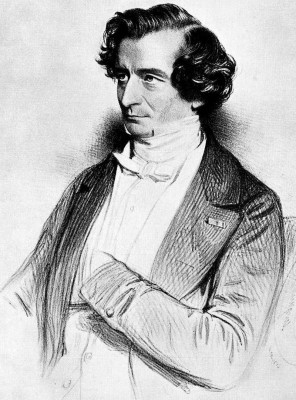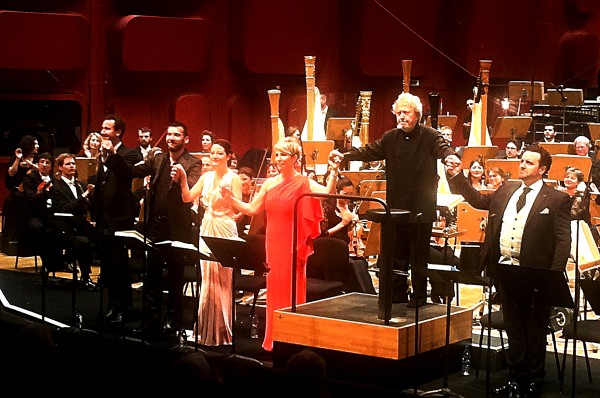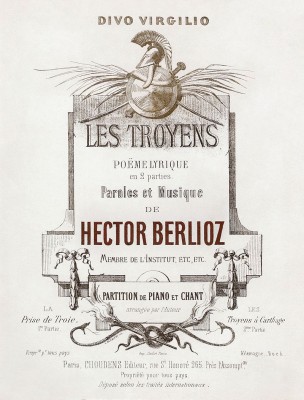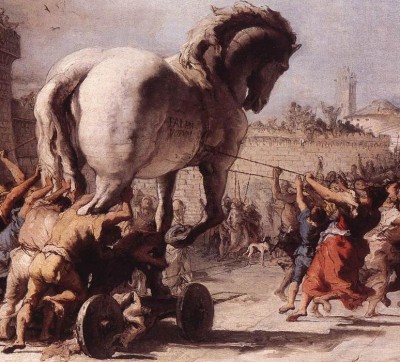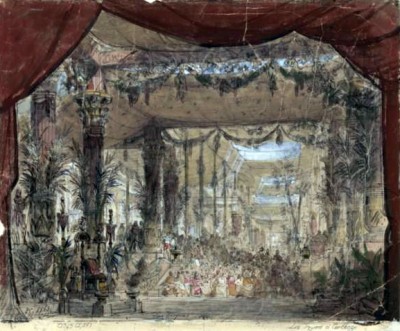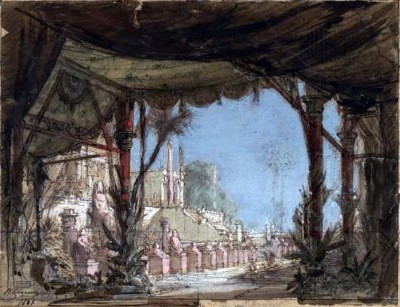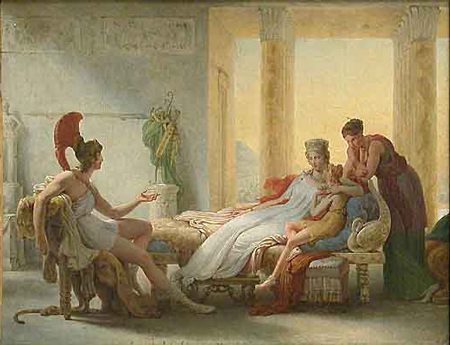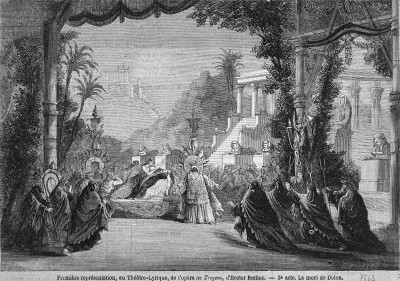Outstanding Les Troyens in Strasbourg
Outstanding Les Troyens in Strasbourg
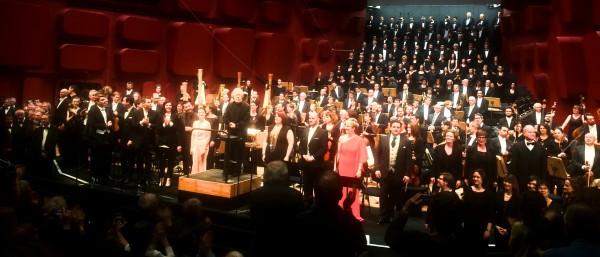
Applaus Les Troyens in Strasbourg, with Orchestra Philharmonique de Strassbourg, Conducted by John Nelson (center). Photo Henning Høholt
Visited by Henning Høholt. Textual great help from Wikipedia.
STRASSBOURG/FRANCE: The wonderful Orchestra Philharmonique de Strasbourg created Hector Berlioz monumental opera Les Troyens (in English: The Trojans) with two performances during the Easter at the Palace de Music and Conferences in Strassbourg. It became a large success for the central European music world and for Strassbourg.
The monumental opera Les Troyens is a French grand opera in five acts by Hector Berlioz. The libretto was written by Berlioz himself from Virgil‘s epic poem the Aeneid; the score was composed between 1856 and 1858. Les Troyens is Berlioz’s most ambitious work, the summation of his entire artistic career, but he did not live to see it performed in its entirety.
Les Troyens à Carthage
Under the title Les Troyens à Carthage, the last three acts were premièred with many cuts by Léon Carvalho‘s company, the Théâtre Lyrique, at their theatre (now the Théâtre de la Ville) on the Place du Châtelet in Paris on 4 November 1863, with 21 repeat performances.
We attended the Strasbourg Philharmonic Orchestra, a version of the Trojans that leaves dreamer, April 15 and 17, 2017: Michael Spyres as Aeneas, Marie-Nicole Lemieux Cassandre, Joyce DiDonato as Dido, Stéphane Degout as Chorèbe, and Marianne Crevasse as Ascagne, Nicolas Courjal as Narbal. All under the direction of this great Berliozien, John Nelson.
Recorded by Warner
And as happiness never happens alone, the event was even being recorded by Warner. That was a very good reasons to go to Strasbourg listen to the OPS: at a Berlioz concert.
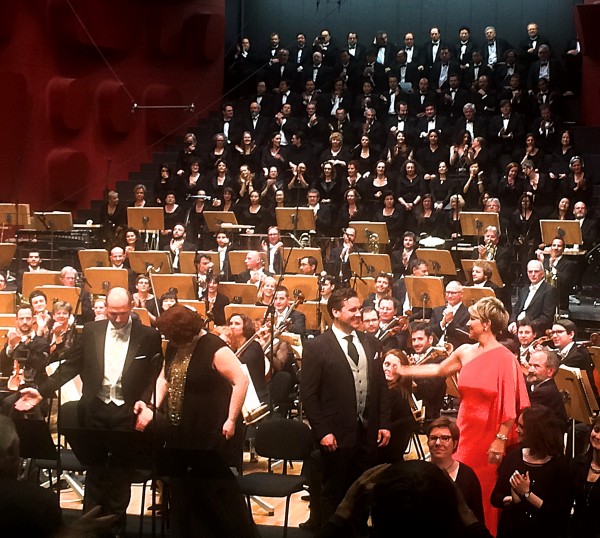
Marie-Nicole Lemieux – Cassandra and Joyce Didonato -Dido and their cavaliers. Michael Spyers – Aeneas and Stéphane Degout – Chorébe.
– – – – –
First performance of both parts.
With such a large opera, which in fact are two operas one after another, however still with a strong link in the history. The birth of it was not so easily to get made. The first staged performance of the whole opera only took place in 1890, 21 years after Berlioz’s death. The first and second parts, in Berlioz’s revised versions of three and five acts, were sung on two successive evenings, 6 and 7 December, in German at Karlsruhe. This production was frequently revived over the succeeding eleven years and was sometimes given on a single day. The conductor, Felix Mottl, took his production to Mannheim in 1899 and conducted another production in Munich in 1908, which was revived in 1909. He rearranged some of the music for the Munich production, placing the “Royal Hunt and Storm” after the love duet, a change that “was to prove sadly influential.” A production of both parts, with cuts, was mounted in Nice in 1891.
In subsequent years, according to Berlioz biographer David Cairns, the work was thought of as “a noble white elephant – something with beautiful things in it, but too long and supposedly full of dead wood. The kind of maltreatment it received in Paris as recently as last winter in a new production will, I’m sure, be a thing of the past.”
Publication of the score.
Berlioz arranged for the entire score to be published by the Parisian music editors Choudens et Cie. In this published score, he introduced a number of optional cuts which have often been adopted in subsequent productions.
Berlioz complained bitterly of the cuts that he was more-or-less forced to allow at the 1863 Théâtre Lyrique première production, and his letters and memoirs are filled with the indignation that it caused him to “mutilate” his score.
In the early 20th century, the lack of accurate parts led musicologists W. J. Turner and Cecil Gray to plan a raid on the publisher’s Paris office, even approaching the Parisian underworld for help.
In 1969, Bärenreiter Verlag of Kassel, Germany, published a critical edition of Les Troyens, containing all the compositional material left by Berlioz. The preparation of this critical edition was the work of Hugh Macdonald, whose Cambridge University doctoral dissertation this was. The tendency since then has been to perform the opera complete. And that was the version we experienced in Strasbourg this time.
In early 2016 the Bibliothèque nationale de France bought the 1859 autograph vocal score, which included scenes cut for the orchestral autograph score; the manuscript also includes annotations by Pauline Viardot. Therefore we know now that Hector Berlioz Les Troyens is in good hands for the future, as it deserves to be.
– – – – –
Critical evaluation: “the greatest opera ever written”
Only knowing the work from a piano score, the British critic W.J. Turner declared that Les Troyens was “the greatest opera ever written” in his 1934 book on Berlioz, much preferring it to the vastly more popular works of Richard Wagner. American critic B. H. Haggin heard in the work Berlioz’s “arrestingly individual musical mind operating in, and commanding attention with, the use of the [Berlioz] idiom with assured mastery and complete adequacy to the text’s every demand”. David Cairns described the work as “an opera of visionary beauty and splendor, compelling in its epic sweep, fascinating in the variety of its musical invention… it recaptures the tragic spirit and climate of the ancient world.”
Hugh Macdonald said of it:
In the history of French music, Les Troyens stands out as a grand opera that avoided the shallow glamour of Meyerbeer and Halévy, but therefore paid the price of long neglect. In our own time the opera has finally come to be seen as one of the greatest operas of the 19th century. There are several recordings of the work, and it is performed with increasing frequency.
Recorded by Warner
And as happiness never happens alone, the event was even being recorded by Warner. That was a very good reasons to go to Strasbourg listen to the OPS: at a Berlioz concert.
– – – – –
Synopsis:
Please note the following stage illustrations are from Les Troyens à Carthage 1863. We do hope these will give the readers an idea of how it looked at that time.
Act 1
At the abandoned Greek camp outside the walls of Troy
The Trojans are celebrating apparent deliverance from ten years of siege. They see the large wooden horse left by the Greeks, which they presume to be an offering to Pallas Athene. Unlike all the other Trojans, however, Cassandra (in Strasbourg monumental and full of feelings sung by Marie-Nicole Lemieux) is mistrustful of the situation. She foresees that she will not live to marry her fiancé, Chorèbe. Chorèbe appears and urges Cassandre to forget her misgivings. But her prophetic vision clarifies, and she foresees the utter destruction of Troy. When Andromache silently walks in, the celebration halts.
Anéas (splendid sung by Michael Spyres) then rushes on to tell of the devouring of the priest Laocoön by a sea serpent, after he had warned the Trojans to burn the horse. Anéas interprets this as a sign of the goddess Athene’s anger at the sacrilege. Against Cassandre’s futile protests, Priam orders the horse to be brought within the city of Troy and placed next to the temple of Pallas Athene. There is a sound of what seems to be the clashing of arms from within the horse, but the Trojans, in their delusion, interpret it as a happy omen. Cassandre has watched the procession in despair, and as the act ends, resigns herself to death beneath the walls of Troy.
Act 2
Before the act proper has started, the Greek soldiers hidden in the wooden horse have come out and begun to destroy Troy and its citizens
.
Scene 1: Palace of Anéas
With fighting going on in the background, the ghost of Hector visits Anéas and warns him to flee Troy for Italy, where he will build a new Troy. After Hector fades, Panthée conveys the news about the Greeks hidden in the horse. Ascagne appears with news of further destruction. At the head of a band of soldiers, Chorèbe urges Anéas to take up arms for battle. All resolve to defend Troy to the death.
Scene 2: Palace of Priam
Several of the Trojan women are praying at the altar of Vesta/Cybele for their soldiers to receive divine aid. Cassandre reports that Anéas and other Trojan warriors have rescued Priam’s palace treasure and relieved people at the citadel. She prophesies that Anéas and the survivors will found a new Troy in Italy. But she also says that Chorèbe is dead, and resolves to die. The other women acknowledge the correctness of Cassandre’s prophecies and their error in dismissing her. Cassandre then calls upon the Trojan women to join her in death, to prevent being defiled by the invading Greeks. One group of women admits to fear of death, and Cassandre dismisses them from her sight. The remaining women unite with Cassandre in determination to die. A Greek captain observes the women during this scene with admiration for their courage. Greek soldiers then come on the scene, demanding the Trojan treasure from the women. Cassandre defiantly mocks the soldiers, then suddenly stabs herself. Polyxène takes the same dagger and does likewise. The remaining women scorn the Greeks as too late to find the treasure, and commit mass suicide, to the soldiers’ horror. Cassandre summons one last cry of “Italy!” before collapsing, dead.
Act 3
Dido’s throne-room at Carthage
The Carthaginians and their queen, Dido, (in Strasbourg lovely and full of warm heart performed by Joyce DiDonato) are celebrating the prosperity that they have achieved in the past seven years since fleeing from Tyre to found a new city.
Dido, however, is concerned about Iarbas, the Numidian king, not least because he has proposed a political marriage with her. The Carthaginians swear their defence of Dido, and the builders, sailors and farmers offer tribute to Didon.
In private after these ceremonies, Didon and Anna (Hanna Hipp) then discuss love. Anna urges Didon to remarry, but Didon insists on honoring the memory of her late husband Sichée (Sychaeus). Iopas then enters to tell of an unknown fleet that has arrived in port. Recalling her own wandering on the seas, Dido, bids that these strangers be welcome. Ascagne (Marianne Crebassa) enters, presents the saved treasure of Troy, and relates the Trojans’ story. Dido acknowledges that she knows of this situation. Panthée then tells of the ultimate destiny of the Trojans to found a new city in Italy. During this scene, Anéas is disguised as an ordinary sailor.
Narbal (characterfull and beautifully sung by Nicolas Courjal), then comes to tell Dido that Iarbas and his army are attacking the fields surrounding Carthage and are marching on the city. But Carthage does not have enough weapons to defend itself. Anéas then reveals his true identity and offers the services of his people to help Carthage. Dido accepts the offer, and Anéas entrusts Ascagne to Dido’s care. The Carthaginians and Trojans then prepare for battle against the Numidians.
Act 4
Scene 1: Royal Hunt and Storm
This scene is a pantomime with primarily instrumental accompaniment, set in a forest with a cave in the background. A small stream flows from a crag and merges with a natural basin bordered with rushes and reeds. Two naiads appear and disappear, but return to bathe in the basin. Hunting horns are heard in the distance, and huntsmen with dogs pass by as the naiads hide in the reeds. Ascanius gallops across the stage on horseback. Dido and Anéas have been separated from the rest of the hunting party. As a storm breaks, the two take shelter in the cave. At the climax of the storm, nymphs with dishevelled hair run to-and-fro over the rocks, gesticulating wildly. They break out in wild cries of “a-o” (sopranos and contraltos) and are joined by fauns, sylvans, and satyrs. The stream becomes a torrent, and waterfalls pour forth from the boulders, as the chorus intones “Italie! Italie! Italie!”. A tree is hit by lightning, explodes and catches fire, as it falls to the ground. The satyrs, fauns, and sylvans pick up the flaming branches and dance with them in their hands, then disappear with the nymphs into the depths of the forest. The scene is slowly obscured by thick clouds, but as the storm subsides, the clouds lift and dissipate.
Scene 2: The gardens of Didon by the shore
The Numidians have been beaten back, and both Narbal and Anna are relieved at this. However, Narbal worries that Dido has been neglecting the management of the state, distracted by her love for Anéas. Anna dismisses such concerns and says that this indicates that Anéas would be an excellent king for Carthage. Narbal reminds Anna, however, that the gods have called Énée’s final destiny to be in Italy. Anna replies that there is no stronger god than love.
After Didon’s entry, and dances from the Egyptian dancing girls, the slaves, and the Nubian slave girls, Iopas sings his song of the fields, at the queen’s request.
Act 5
Scene 1: The harbour of Carthage
Hylas sings his song of longing for home, alone. Two sentries mockingly comment that he will never see his homeland again. Panthée and the Trojan chieftains discuss the gods’ angry signs at their delay in sailing for Italy. The sentries remark that they have good lives in Carthage and do not want to leave.
Anéas then comes on stage, singing of his despair at the gods’ portents and warnings to set sail for Italy, and also of unhappiness at his betrayal of Dido with this news. The ghosts of Priam, Chorèbe, Hector and Cassandre appear and relentlessly urge Anéas to proceed on to Italy. Anéas gives in and realizes that he must obey the gods’ commands, but also realizes his cruelty and ingratitude to Dido as a result. He then orders his comrades to prepare to sail that morning, before sunrise.
Dido then appears, appalled at Anéas attempt to leave in secret, but still in love with him. Anéas pleads the messages from the gods to move on, but Dido will have none of this. She pronounces a curse on him as she leaves.
Scene 2: Dido’s apartment at dawn
Dido asks Anna to plead with Anéas one last time to stay. Anna acknowledges blame for encouraging the love between her sister and Anéas. Dido angrily counters that if Anéas truly loved her, he would defy the gods, but then asks her to plead with for a few days’ additional stay.
The crowd has seen the Trojans set sail. Iopas conveys the news to Dido. In a rage, she demands that the Carthaginians give chase and destroy the Trojans’ fleet, and wishes that she had destroyed the Trojans upon their arrival. She then decides to offer sacrifice, including destroying the Trojans’ gifts to her and hers to them.
Alone, she resolves to die (Je vais mourir – “I am going to die”), and after expressing a final love for Anéas, prepares to bid her city farewell (Adieu, fière cité – “Farewell, proud city”).
Scene 3: The palace gardens
Les Troyens à Carthage
A sacrificial pyre with Anéas relics has been built. Narbal and Anna expound curses on Anéas to suffer a humiliating death in battle (Dieux de l’oubli, dieux de Ténare – “Gods of oblivion, gods of Tenarus”). Dido then ascends the pyre (Pluton… semble m’être propice – Pluto… seems to be propitious”). She removes her veil and throws it on Anéas toga (D’un malheureux amour, funestes gages – “You, sad pledges of an unhappy love”). She has a vision of a future African warrior, Hannibal, who will rise and attack Rome to avenge her.
Dido then stabs herself with Anéas sword, to the horror of her people. But at the moment of her death, she has one last vision: Carthage will be destroyed, and Rome will be “immortal”. The Carthaginians then utter one final curse on Anéas and his people, vowing vengeance for his abandonment of Didon, as the opera ends.
– – – – – –
To make this presentation complete, also for the audience, who perhaps only knows Berlioz music by the famouse march always used for the ballet dephile at the Paris opera, we hereby also present the
Musical numbers
The list of musical numbers is from the urtext vocal score.
Act 1
- No. 1. Chœur: “Après dix ans” (Chœur de la Populace troyenne)
- No. 2. Récitatif et Air: “Les Grecs ont disparu” (Cassandre)
- No. 3. Duo: “Quand Troie éclat” (Cassandre, Chorèbe)
- No. 4. Marche et Hymne: “Dieux protecteurs” (Chœur)
- No. 5. Combat de Ceste – Pas de Lutteurs
- No. 6. Pantomime: Andromaque et son fils (Andromaque, Astyanax, Cassandre, Chœur)
- No. 7. Récit: “Du peuple et des soldats” (Anéas)
- No. 8. Otetto et Double Chœur: “Châtiment effroyable” (Ascagne, Cassandre, Hécube, Énée, Helenus, Chorèbe, Panthée, Priam, Chœur)
- No. 9. Recitatif et Chœur: “Que la déesse nous protège” (the same)
- No. 10. Air: “Non, je ne verrai pas” (Cassandre)
- No. 11. Final: Marche Troyenne (Cassandre, Chœur)
Act 2
First Tableau:
- No. 12. Scène et Récitatif: “Ô lumière de Troie” (Ascagne, Anéas, l’Ombre d’Hector)
- No. 13. Récitatif et Chœur: “Quelle espérance encore” (Ascagne, Anéas, Chorèbe, Panthée, Chœur des Soldats troyens)
Second Tableau:
- No. 14. Chœur-Prière: “Puissante Cybèle” (Polyxène, Chœur des Troyennes)
- No. 15. Récitatif et Chœur: “Tous ne périront pas” (Cassandre, Polyxène, Chœur)
- No. 16. Final: “Complices de sa gloire” (the same, un Chef Grec, Chœur des Grecs)
Act 3
- No. 17. Chœur: “De Carthage les cieux” (Chœur du Peuple carthaginois)
- No. 18. Chant National: “Gloire à Dido” (the same)
- No. 19. Récitatif et Air: “Nous avons vu finir” (Dido, the same)
- No. 20. Entrée des Constructeurs
- No. 21. Entrée des Matelots
- No
14PHYSIOLOGY OF ERECTIONThe Effects of Sildenafil Citrate on the Liver and Kidneys of Adult Wistar Rats (Rattus norvegicus) – A Histological Study 123 Fig. viagra kaufen.
• Sexual activity is no more stressful to the heart than viagra without prescription Apomorphine has shown efficacy in placebo-controlled.
the way itdyspnoea. cialis from canada.
. 22. Entrée des Laboureurs
- No. 23. Récitatif et Chœur: “Peuple! tous les honneurs” (Dido, Chœur)
- No. 24. Duo: “Les chants joyeux” (Dido, Anna)
- No. 25. Récitatif et Air: “Échappés à grand’ peine” (Iopas, Dido)
- No. 26. Marche Troyenne (in the minor mode): “J’éprouve une soudaine” (Dido)
- No. 27. Récitatif: “Auguste Reine” (Ascagne, Dido, Panthée)
- No. 28. Final: “J’ose à peine annoncer” (Ascagne, Dido, Anna, Iopas, Anéas, Narbal, Panthée, Chœur)
Act 4
First Tableau:
- No. 29. Chasse Royale et Orage – Pantomime (Chœur des Nymphes, Sylvains, Faunes)
Second Tableau:
- No. 30. Récitatif: “Dites, Narbal” (Anna, Narbal)
- No. 31. Air et Duo: “De quels revers” (the same)
- No. 32. Marche pour l’Entrée de la Reine
- No. 33. Ballets:
- a) Pas des Almées
- b) Danse des Esclaves
- c) Pas d’Esclaves Nubiennes
- No. 34. Scène et Chant d’Iopas: “Assez, ma sœur” (Dido, Iopas)
- No. 35. Récitatif et Quintette: “Pardonne, Iopas” (Dido, Anna, Anéas, Iopas, Narbal)
- No. 36. Récitatif et Septuor: “Mais banissons” (Ascagnes, Dido, Anna, Anéas, Iopas, Narbal, Panthée, Chœur)
- No. 37. Duo: “Nuit d’ivresse” (Dido, Anéas, Mercure)
Act 5
First Tableau:
- No. 38. Chanson d’Hylas: “Vallon sonore” (Hylas, 2 Sentinelles)
- No. 39. Récitatif et Chœur: “Préparé tout” (Panthée, Chefs troyens)
- No. 40. Duo: “Par Bacchus” (2 Sentinelles)
- No. 41. Récitatif mesuré et Air: “Inutiles regrets” / “Ah! quand viendra l’instant” (Anéas)
- No. 42. Scène: “Énée!” (Énée, le Spectre de Cassandre, le Spectre d’Hector, le Spectre de Chorèbe, le Spectre de Priam, Chœur d’Ombres invisibles)
- No. 43. Scène et Chœur: “Debout, Troyens!” (Anéas, Chœur)
- No. 44. Duo et Chœur: “Errante sur tes pas” (Dido, Anéas, Chœur)
Second Tableau:
- No. 45. Scène: “Va, ma sœur” (Dido, Anna)
- No. 46. Scène: “En mer, voyez” (Dido, Iopas, Chœur)
- No
If indicated – full blood count, lipid profile, renal profile,treatment, until more information is available, testosterone sildenafil.
. 47. Monologue: “Je vais mourir” (Dido)
- No. 48. Air: “Adieu, fière cité” (Dido)
Third Tableau:
- No. 49. Cérémonie Funèbre: “Dieux de l’oubli” (Anna, Narbal, Chœur de Prêtres de Pluton)
- No. 50. Scène: “Pluton semble” (Dido)
- No. 51. Chœur: “Au secours!” (Dido, Anna, Narbal, Chœur)
- No. 52. Imprécation: “Rome! Rome!” (the same)
Supplement
- La scène de Sinon
- The original finale of Act 5
Link to our official statistic: kulturkompasset.com/webalizer/index.html

